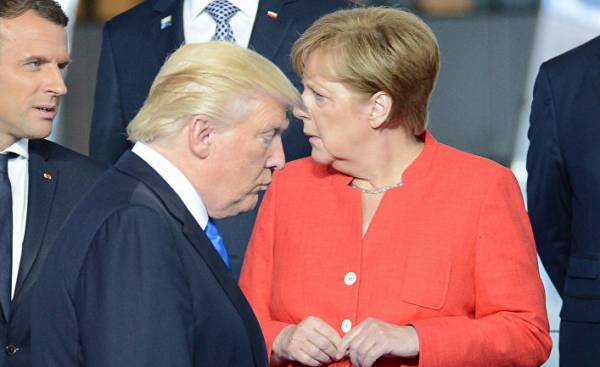
Last week the Senate by 97 votes to two voted to extend anti-Russian sanctions. It was quite a remarkable manifestation of inter-party unity (and concerns) on the issue of Russian interference in the presidential election of 2016. The house of representatives decided to pass the bill to the Committee on foreign Affairs — ostensibly on procedural, not political reasons. Thus, the law is temporarily put on hold. But foreign allies in Europe are very sharply reacted to this bill because it will negatively affect European companies from the energy and other sectors.
The essence of the bill?
It adds new measures to the sanctions imposed by the United States in 2014, with the support of the Europeans after the Russian annexation of Crimea and Russia’s actions in Eastern Ukraine. EU leaders in Germany, Austria and other countries reacted to the new bill, with a sneer. The press Secretary of German Chancellor Angela Merkel Steffen Seibert (Steffen Seibert) said the decision of the Senate “to put it mildly, strange”, echoing the views expressed by the Minister of foreign Affairs Sigmar Gabriel.
Why Europe is so unhappy?
There are three ways in which Europe refers to the Senate bill with great skepticism. This dissatisfaction with the fact that USA is cooperation resort to unilateral action; this concern about the impact of sanctions on European companies; and this dispute about the future of European energy security.
Europeans fear that America will exclude them from the decision-making process
Sanctions against Russia in 2014. They were caused by the Russian annexation of Crimea and Moscow’s actions in Eastern Ukraine, but not its interference in foreign elections, from which the Europeans also suffered. The issue of sanctions was resolved jointly and unanimously as America and Europe. As noted by the Chancellor of Austria, Christian Kern, and the Minister of foreign Affairs of Germany Gabriel, since the introduction of sanctions exists a transatlantic consensus on their need. I must say that the European Union last week, and he voted to extend its sanctions against Russia. Europe seems to have decided to emphasize that speaking out against new sanctions, it is not going to soften their stance against Moscow.
But when the Senate passed the law on the extension of sanctions, he changed the justification, to belittle the importance of underlining Ukraine and Russian intervention in the American elections. This means that the original goal of the sanctions is to punish Russia for invasion of Ukraine and destabilization of this country has faded into the background. Thus, because of the new bill will be much harder to keep the pressure on Moscow, seeking from her the implementation of the peace agreement. In addition, it will damage the cause of peace in General.
The decision of the us lawmakers to punish Russia unilaterally can have negative consequences. They are rightly worried about the Russian measures, which are aimed at undermining relations between the United States and its Atlantic allies. But it is possible that American actions will only aggravate the situation, causing further disagreements between America and Europe.
The United States threatened to punish European companies without the consent of the European
The Europeans also do not like the Senate bill, because the European companies will be more difficult to do business with Russia. He will act extraterritorially, imposing restrictions on foreign firms and at the same time helping us exporters of energy resources.
This bill is directed against companies that support “Russian export pipelines”. It can create problems such corporations as Shell, OMV and Engie who favor the Moscow plan for the construction of the pipeline “Nord stream 2”. Through this pipeline, Russian gas will be supplied to Europe. Washington has long been concerned that this pipeline will increase the EU’s dependence on Russian energy supplies. This is a concern shared by some EU countries. However, Europeans believe that it is their business, and in any case not Washington.
The Senate bill quite openly acknowledges the priority of U.S. energy exports. The Senate notes that this will create new jobs in the United States and strengthen the American foreign policy. European leaders like the fact that the United States expand the export capacity of liquefied natural gas, but they are unhappy that this is happening under the guise of the sanctions regime.
Between the United States and Europe, there are deep disagreements on the issue of European energy security
Because Americans are concerned about the dependence of Europeans on Russian gas, they believe that the main advantage of the new sanctions is the destruction of the gas cooperation between the EU and Russia.
Of course, the Europeans don’t agree with it. They do not agree with this since, as the Soviet Union in the second half of the twentieth century, began to supply gas to Western Europe. Where U.S. sees Russian threat, Europe sees cheap and reliable energy supplies. Europe rightly believes that Russia depends on how the consumer much more than it depends on Russia as a supplier. Moscow supplies gas to other countries, such as China, but at lower prices. It is the European market keeps afloat the Russian gas industry.
Americans understand this the wrong way. Republican senators John McCain and John Hoeven (John Hoeven) wrote in a 2014 article in the Wall Street Journal in which he urged the United States to take advantage of its potential LNG to “liberate our allies from Russia’s gas stranglehold tightened around his throat European market.” The problem is that the Europeans do not really want this release. Russian gas is much cheaper than us LNG, and the price could further drop to weaken the US position in the event of their arrival on the European market. American suppliers of liquefied natural gas in priority to the profit, not the strategic advantage of America, and they certainly want to cooperate with more profitable markets than the European, say, Japan. Finally, the Russian gas deliveries more reliable than American, because they are based on predictable long-term contracts, while production in the United States increased, is reduced depending on the reduction in price and the appreciation of the works for extraction of unconventional hydrocarbons. While U.S. exporters will begin to deliver gas cheaper than the Russian and they will overtake Russia in terms of reliability of supply, their hydrocarbons are unlikely to have a major impact on EU markets.
As a result, American policy makers do not understand what is really important for the European energy markets. Most likely, they will continue to cause wonder and consternation in Brussels for its new sanctions. If Russia really wants deterioration in European-American relations, she just has to stand back and do nothing.
Luke Macl — a graduate of the Davis center for Russian and Eurasian studies at Harvard University.







